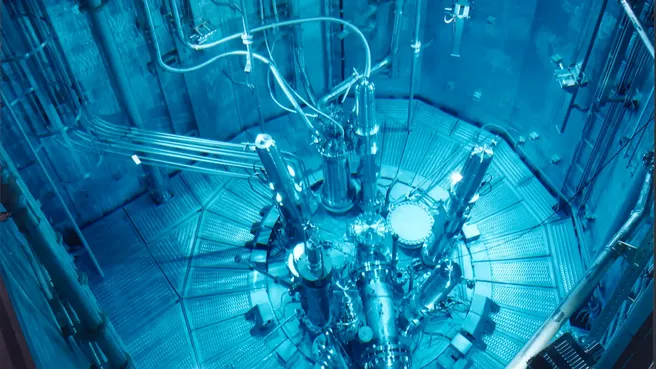Green light for further research projects on low-enriched uranium nuclear fuel: Europe, the federal government and the Free State of Bavaria are funding two corresponding scientific programs at the FRM II research neutron source at the Technical University of Munich (TUM). The Bavarian Ministry of Science and the Federal Ministry of Education and Research are sharing a funding sum of 5.2 million euros. And the EU is providing 7.6 million euros, of which one million euros will go directly to TUM as the European consortium leader.
Prof. Christian Pfleiderer, Scientific Director of FRM II, emphasizes: “These funding commitments are enormously important signals from politics to research. They will enable us to strengthen Bavaria's, Germany's and Europe's leading position in nuclear technology in the long term and lead important research with neutrons into the future.”
Bavaria's Science Minister Markus Blume explained: “Research strength and openness to technology without ideological blinkers are prerequisites for a good and safe future. We want to operate Germany's most powerful research reactor with the innovative low-enriched fuel in the future - with the same scientific performance as before. The fact that research and development for the conversion in the EU-wide project is largely being carried out at the TUM Center for Nuclear Safety and Innovations shows this: Bavarian expertise in this area is world-class. Bavaria has traditionally played a pioneering role in nuclear research - and will continue to do so in the future.”
EU-CONVERSION program
Like the FRM II, other research reactors in Europe have also committed to converting their fuel elements from high to low enriched uranium. Institutes and companies from Germany, France, Belgium and the Czech Republic have therefore joined forces in the EU-CONVERSION project. The long-term goal of the cooperation and the basis for EU participation via the European Atomic Energy Community (Euratom) is to ensure a secure supply of medical radioisotopes for Europe.
“In this research alliance, TUM will focus on the development of simulations and experiments to qualify the new fuel elements,” explains Dr. Bruno Baumeister, project manager of the FRM II conversion and coordinator of EU-CONVERSION. In addition, there is an international master's program with leading European and international universities with the aim of significantly improving training in nuclear technology topics.
Suitable fuel for the FRM II
As part of the FRM2427 project, which is funded by the federal and state governments until mid-2027, researchers at FRM II will develop an optimized design for a fuel element with low-enriched uranium and carry out important validation experiments. They are thus continuing their many years of joint funding for the conversion. “We want to provide the best possible fuel element for the FRM II,” says Dr. Christian Reiter, Head of the TUM Center for Nuclear Safety and Innovation. “After all, this is a world-class large-scale research facility that is of enormous importance for medicine, materials science and basic research, among other things.”
Further information and links
Participants in the EU project:
- Technical University of Munich (Germany)
- Framatome (France)
- Institut Laue-Langevin (France)
- Studiecentrum voor Kernenergie (Belgium)
- Commissariat à l'énergie atomique et aux énergies alternatives (France)
- Université Grenoble Alpes (France)
- Centrum Vyzkumu Rez (Czech Republic)
- Statni Ustav Radiacni Ochrany (Czech Republic)
Societé technique pour l'énergie atomique Technicatome (France)
Contact to this article:
Prof. Dr. Christian Pfleiderer
Scientific Director of the FRM II
Technical University of Munich
Phone +49 89 289-14965
Christian.Pfleiderer@frm2.tum.de
Technical University of Munich
Corporate Communications Center
- Ulrich Meyer
- presse@tum.de
- Teamwebsite
Original article: https://www.tum.de/en/news-and-events/all-news/press-releases/details/forschung-zur-umruestung-des-frm-ii-kann-weiterlaufen
